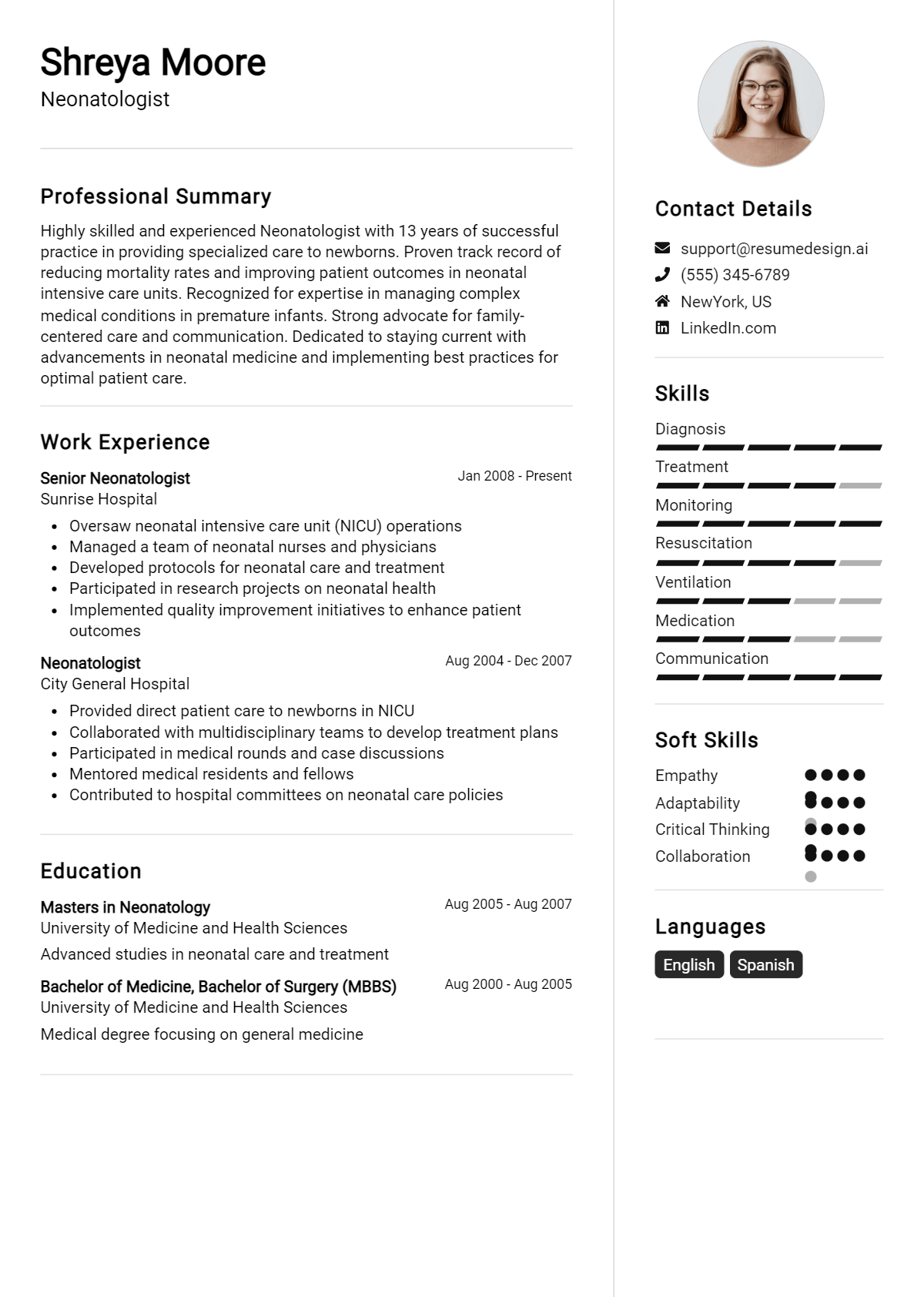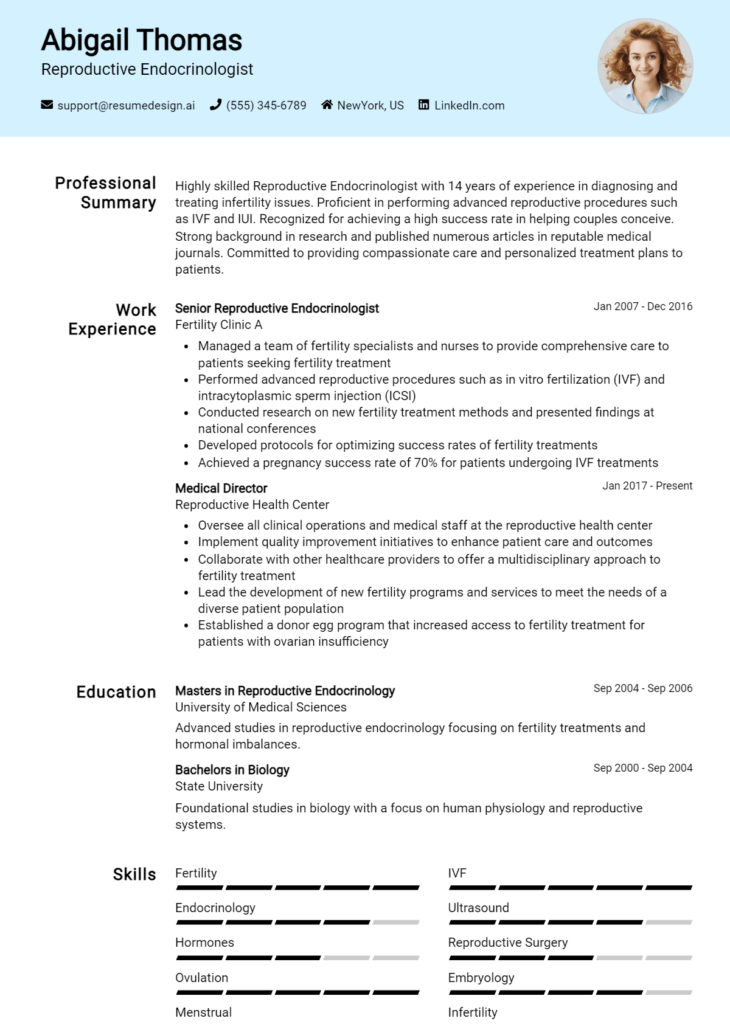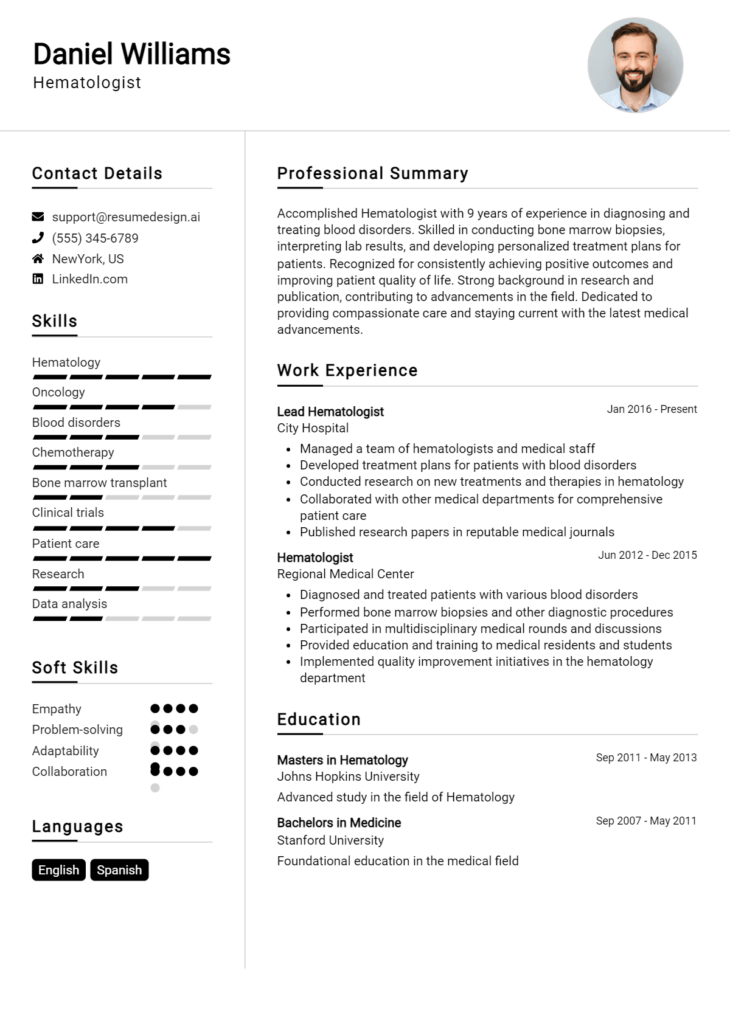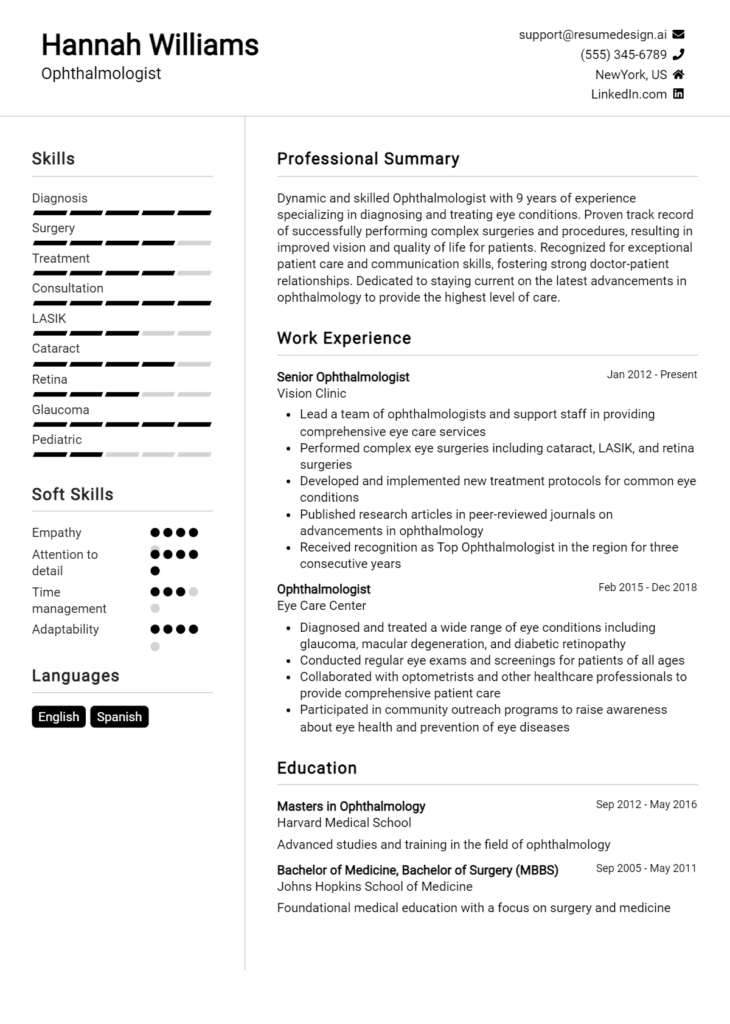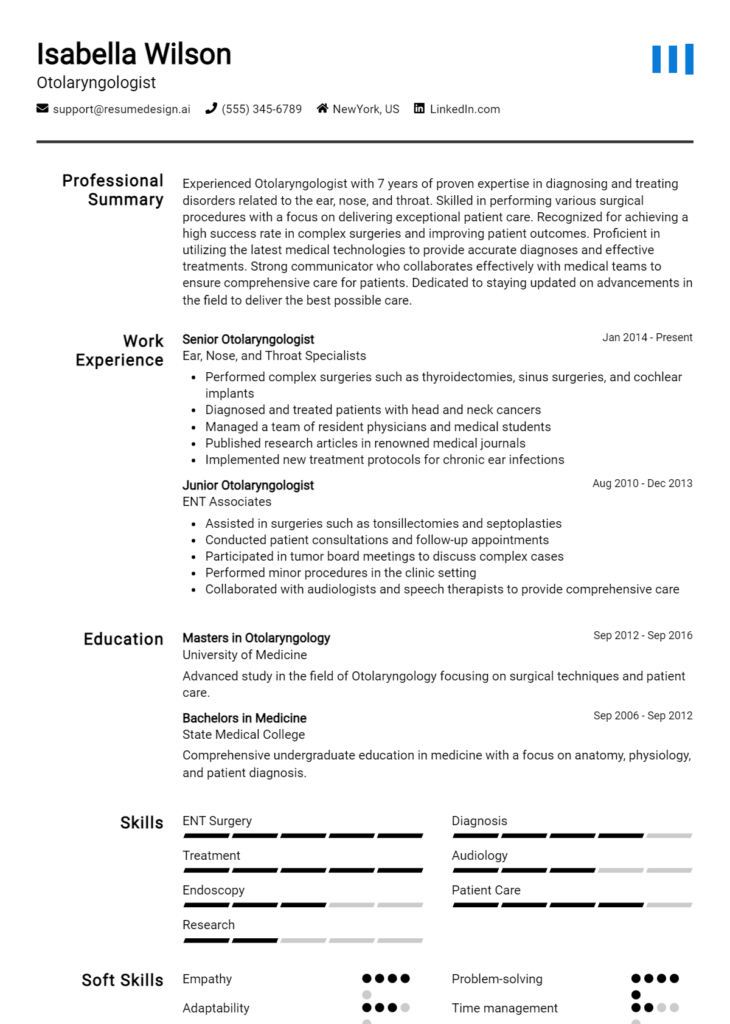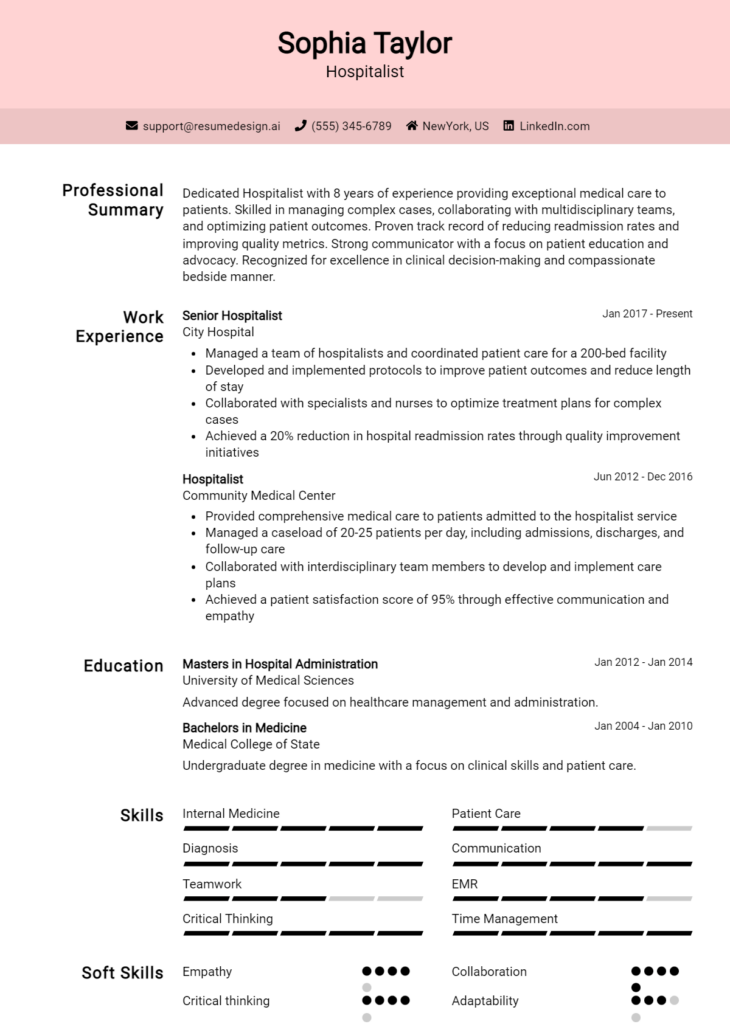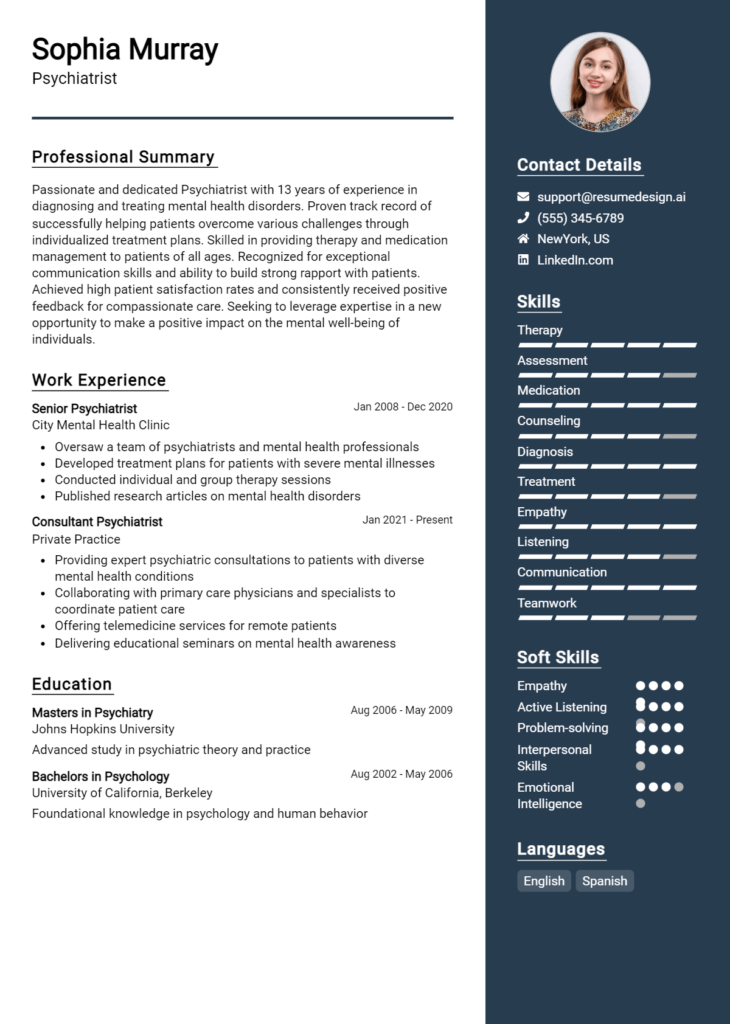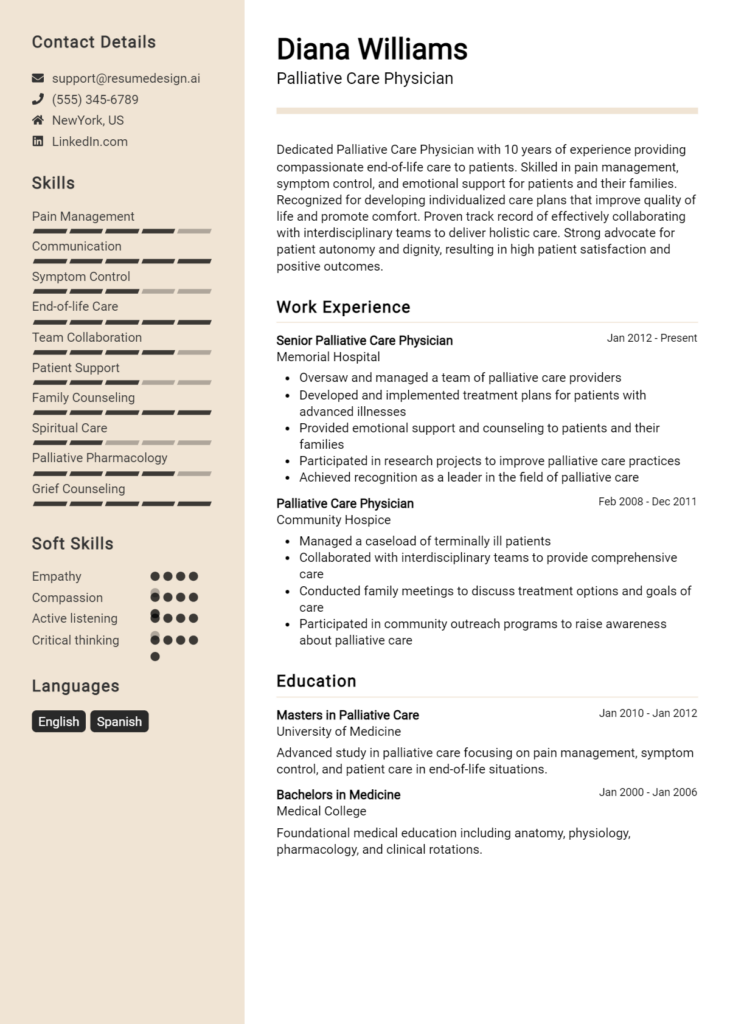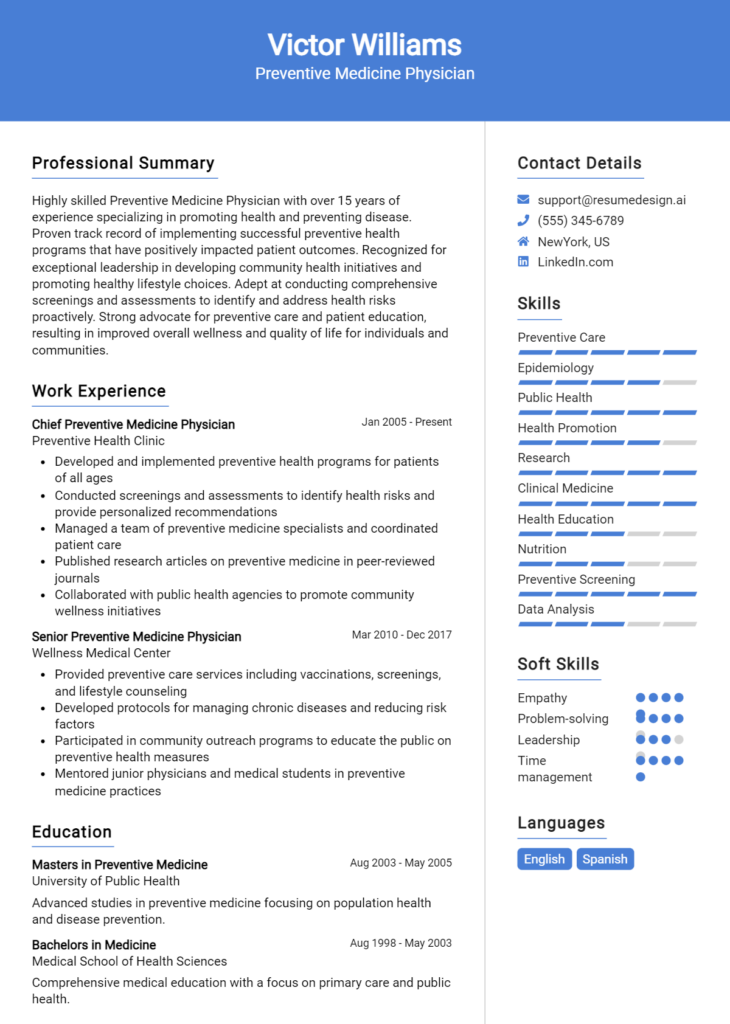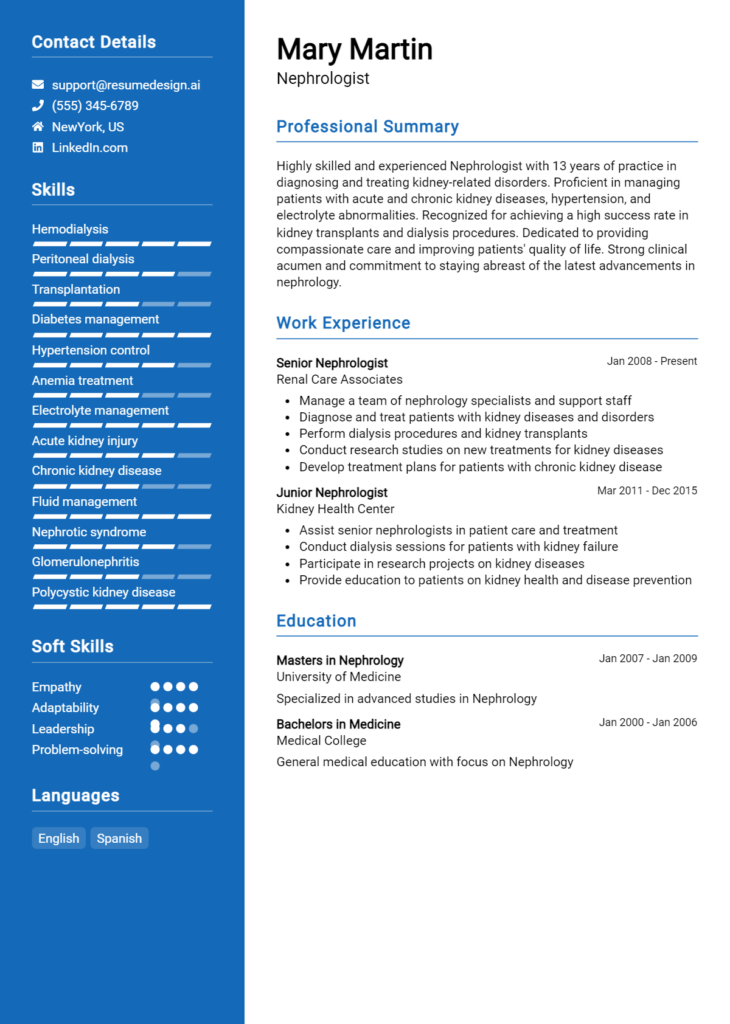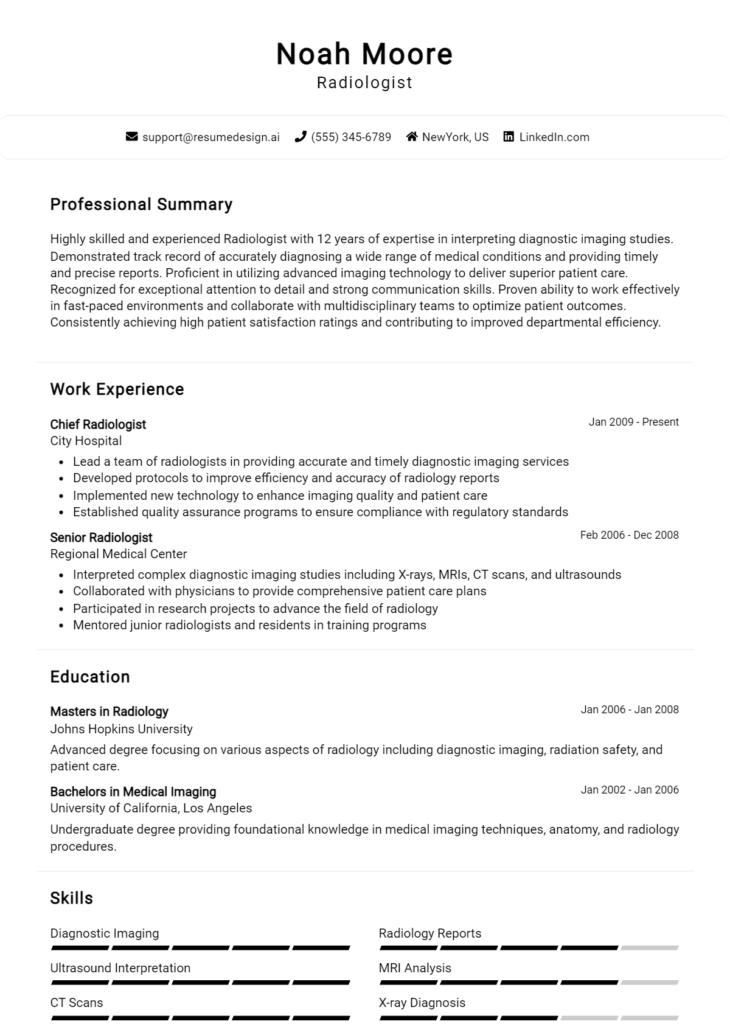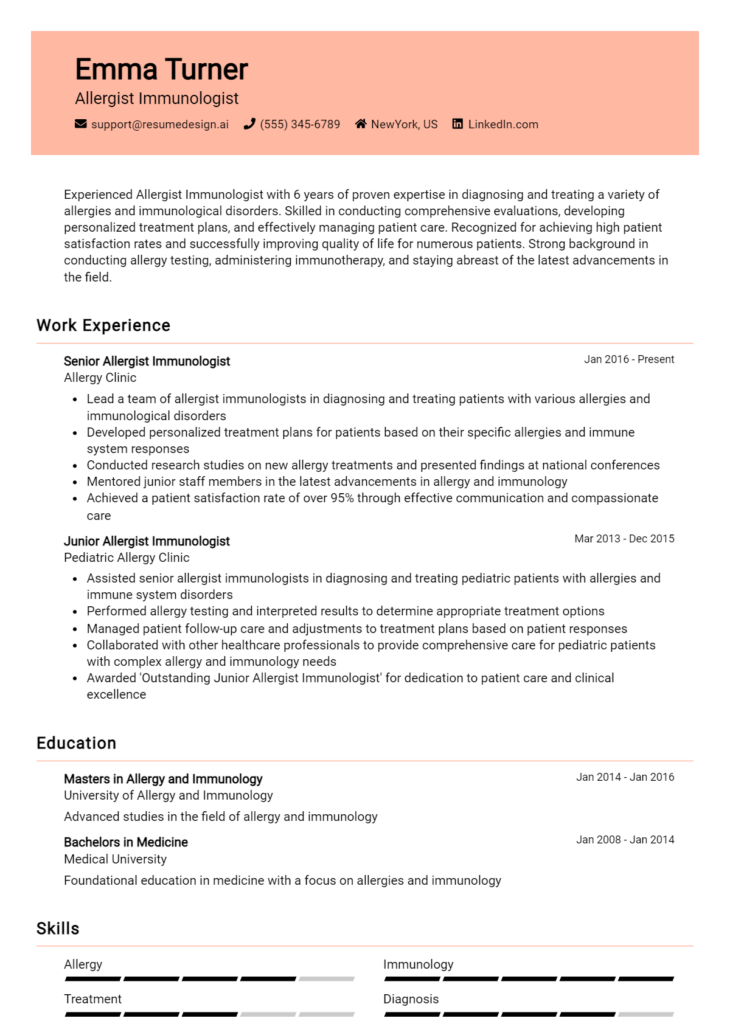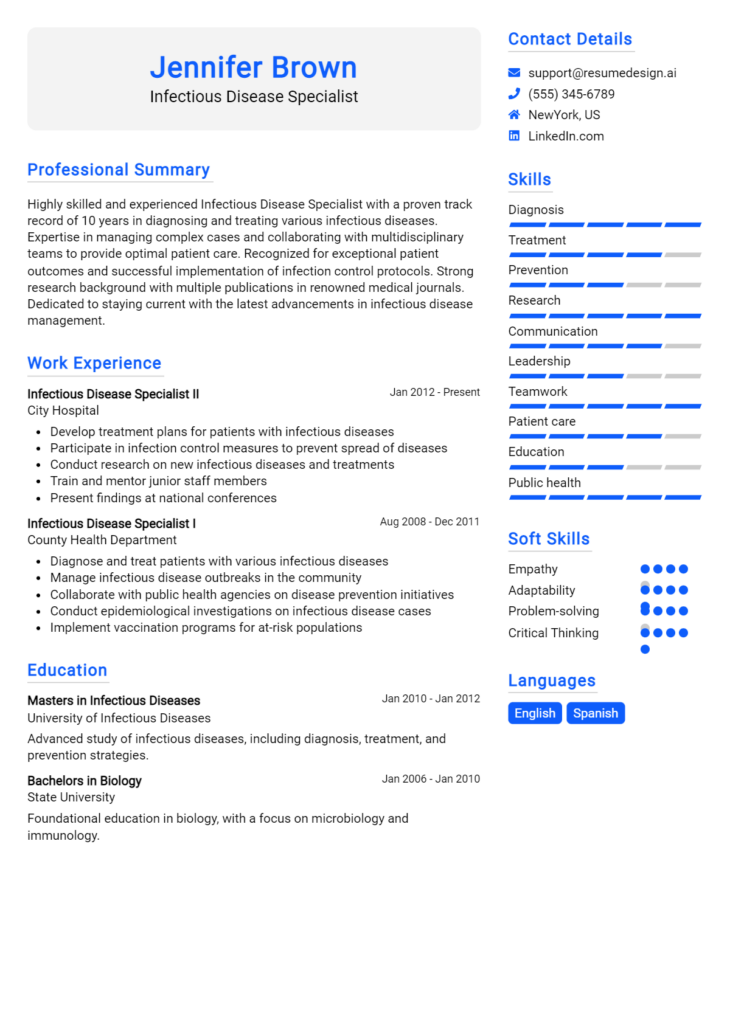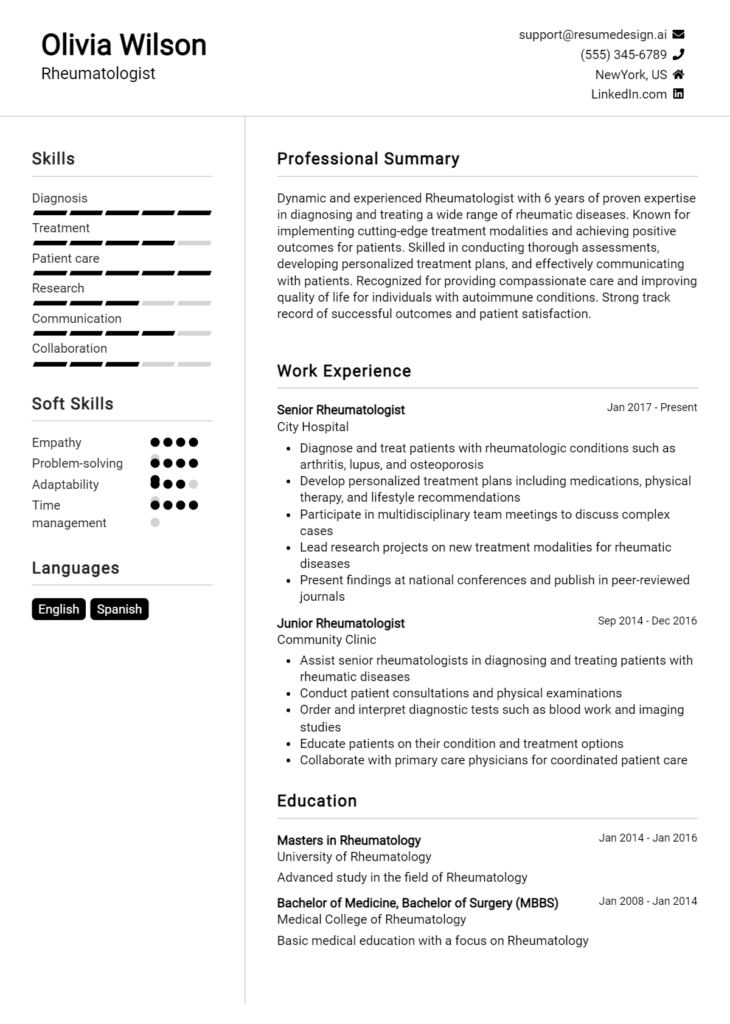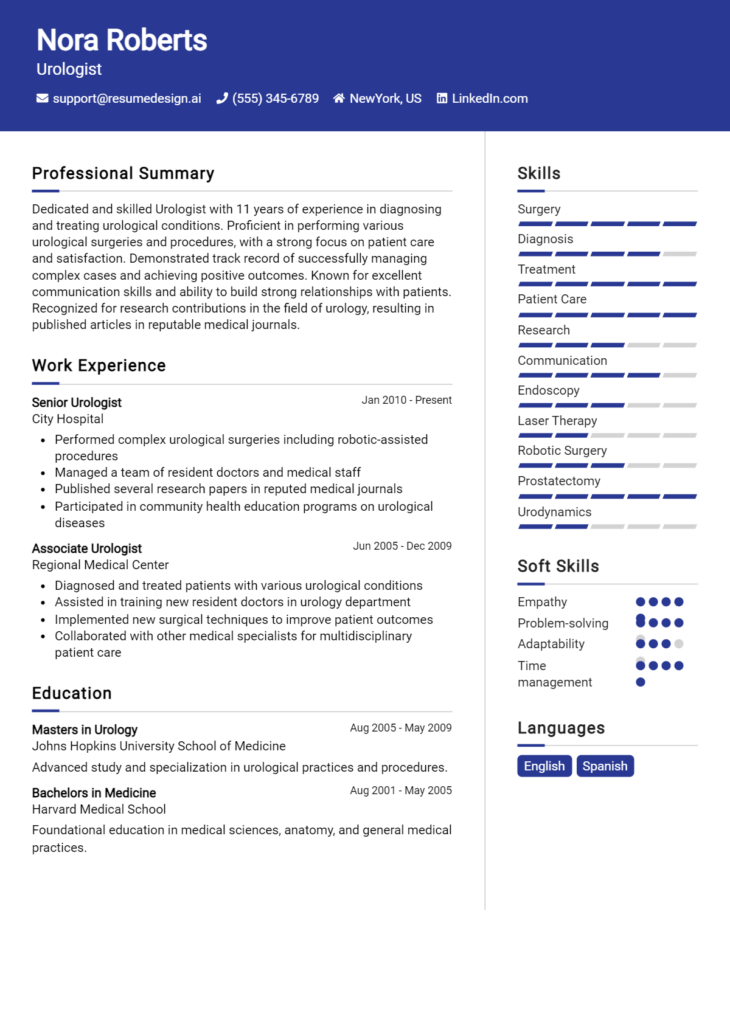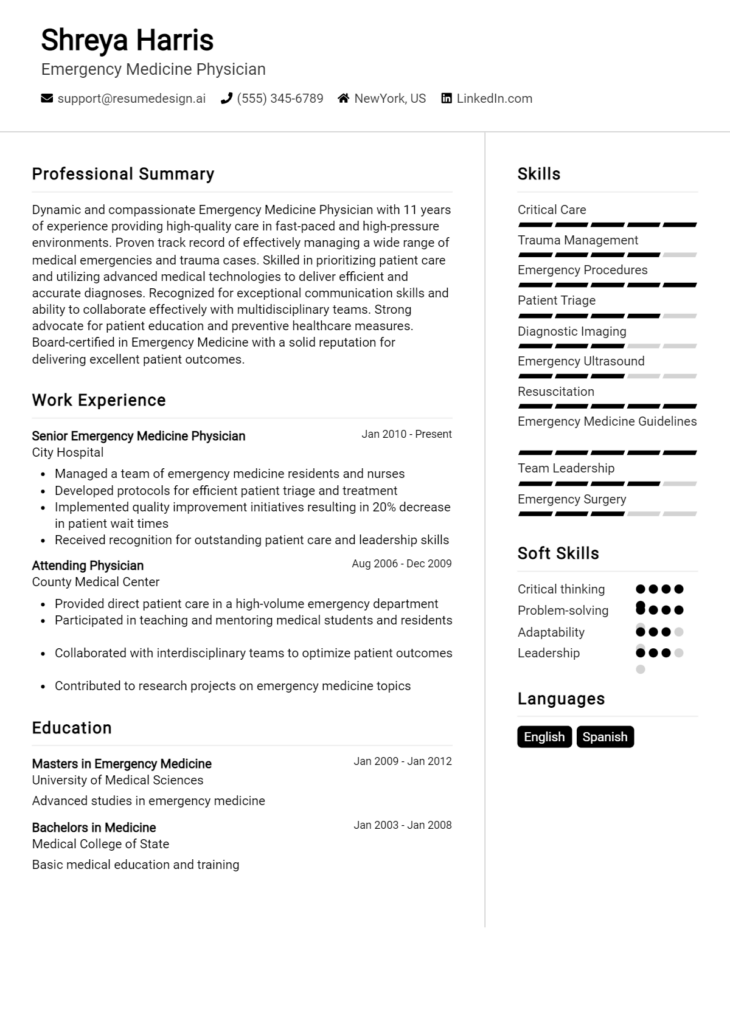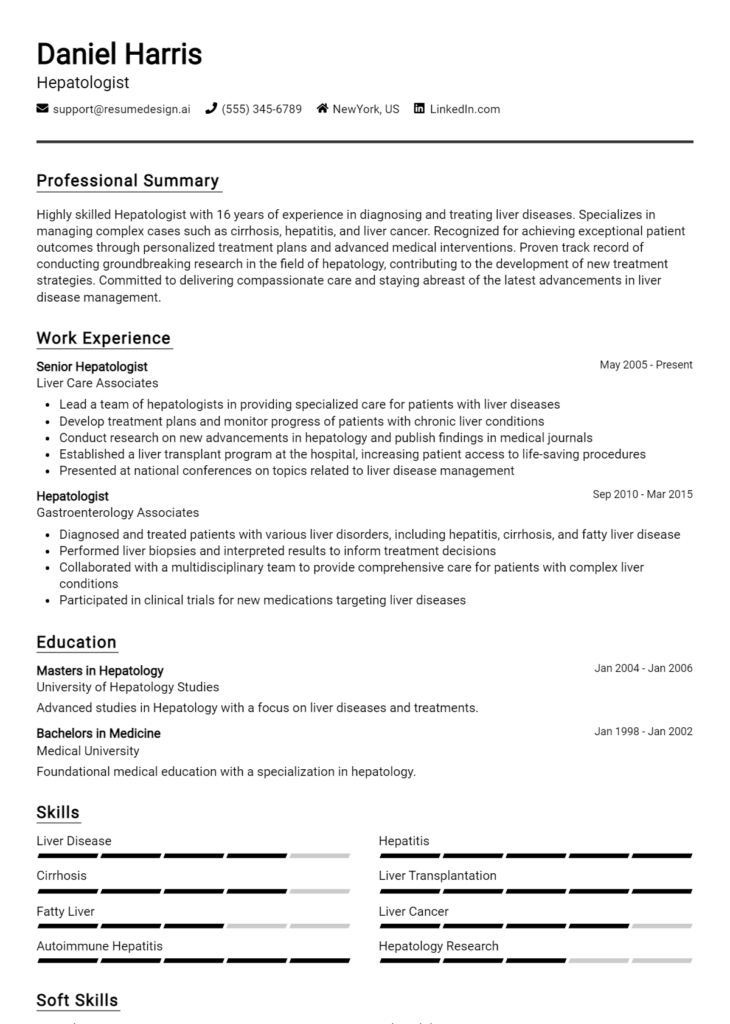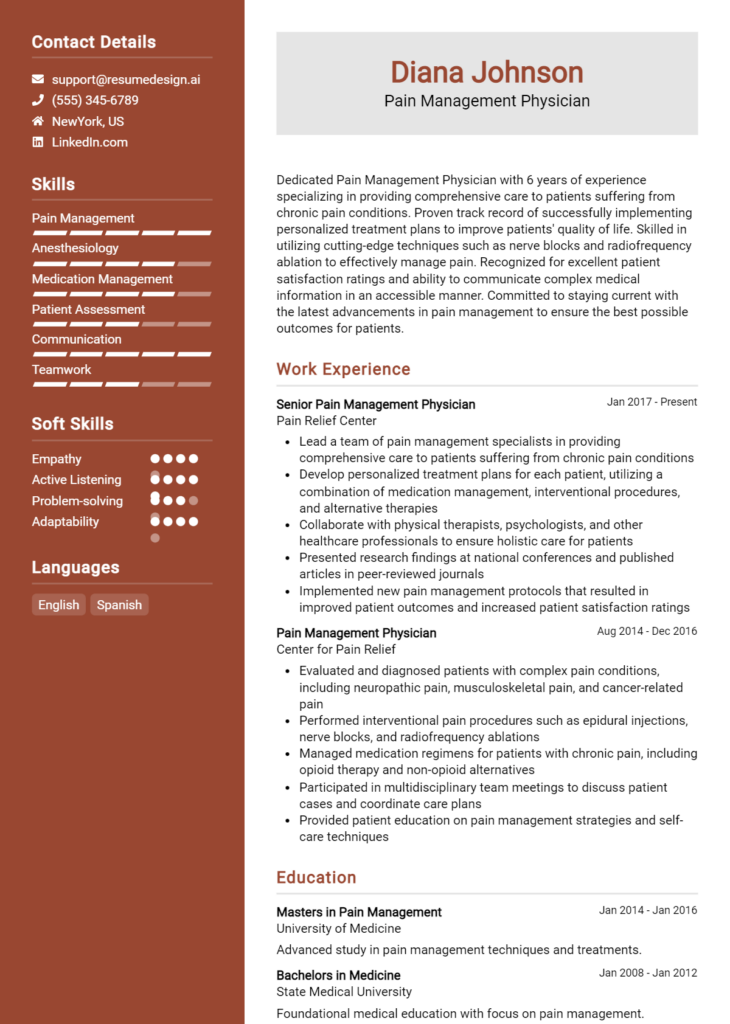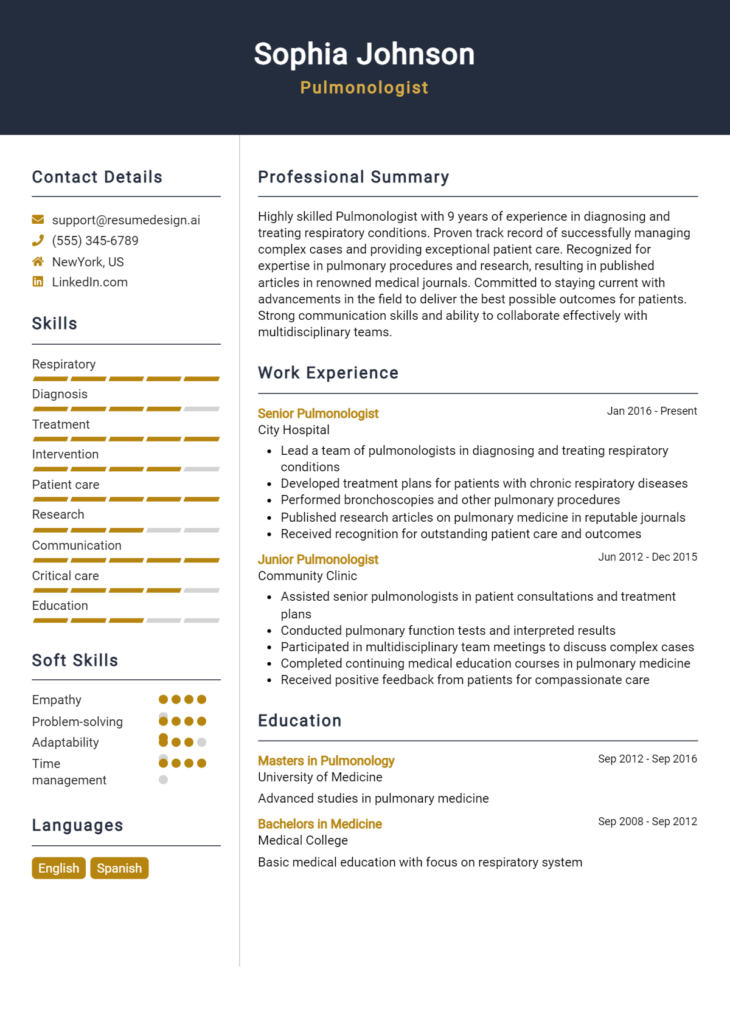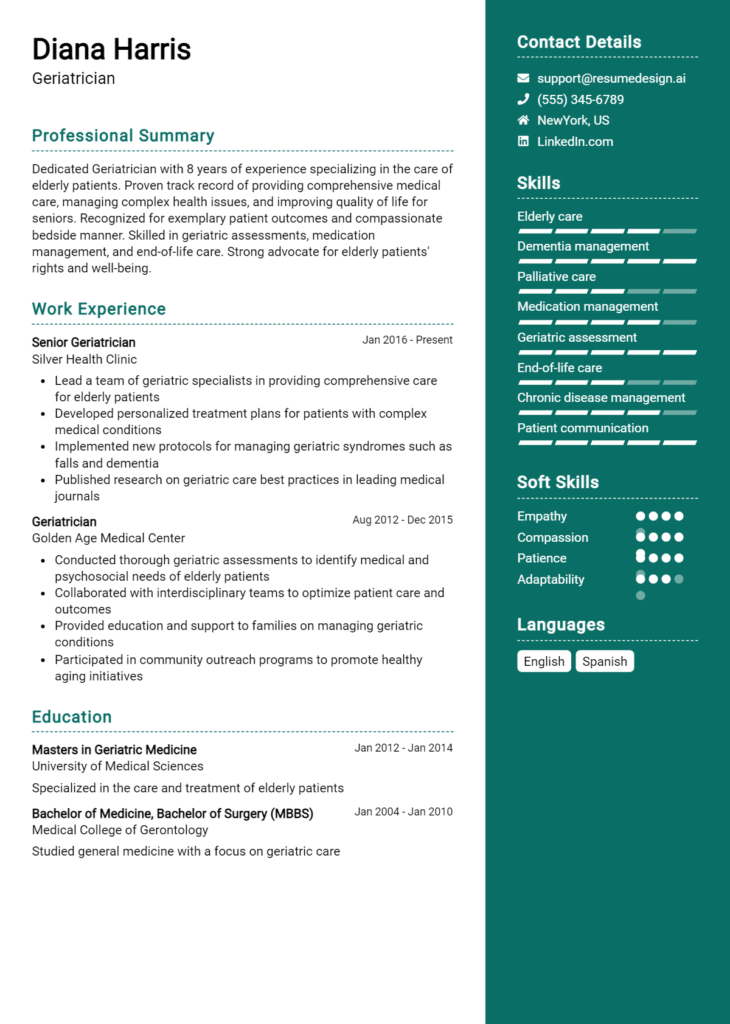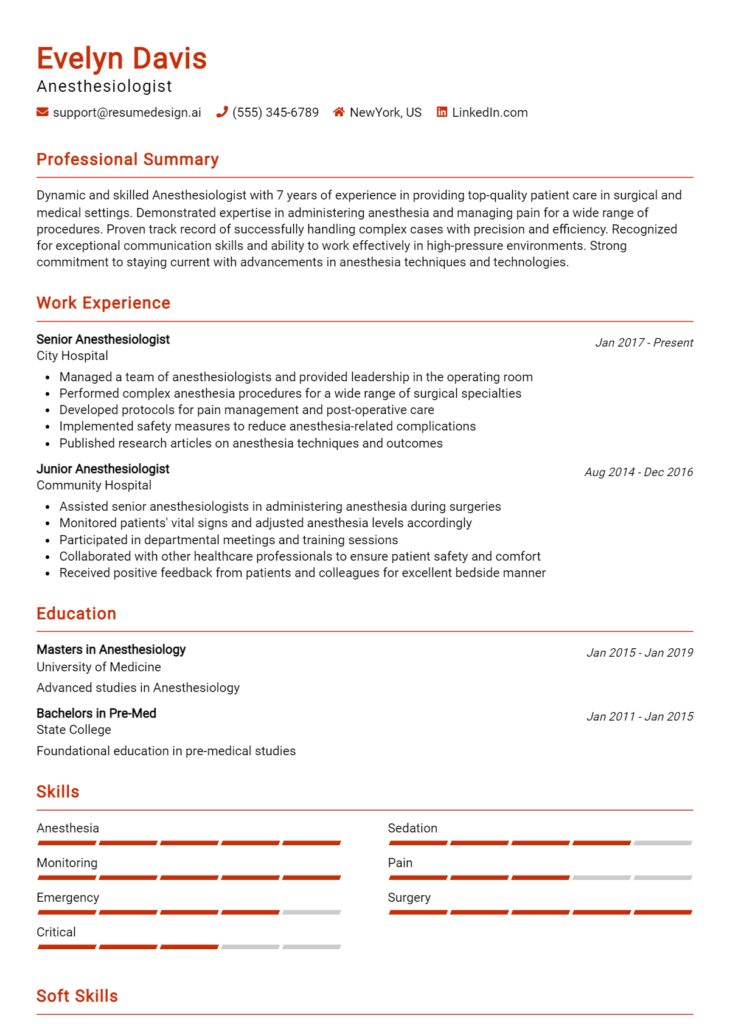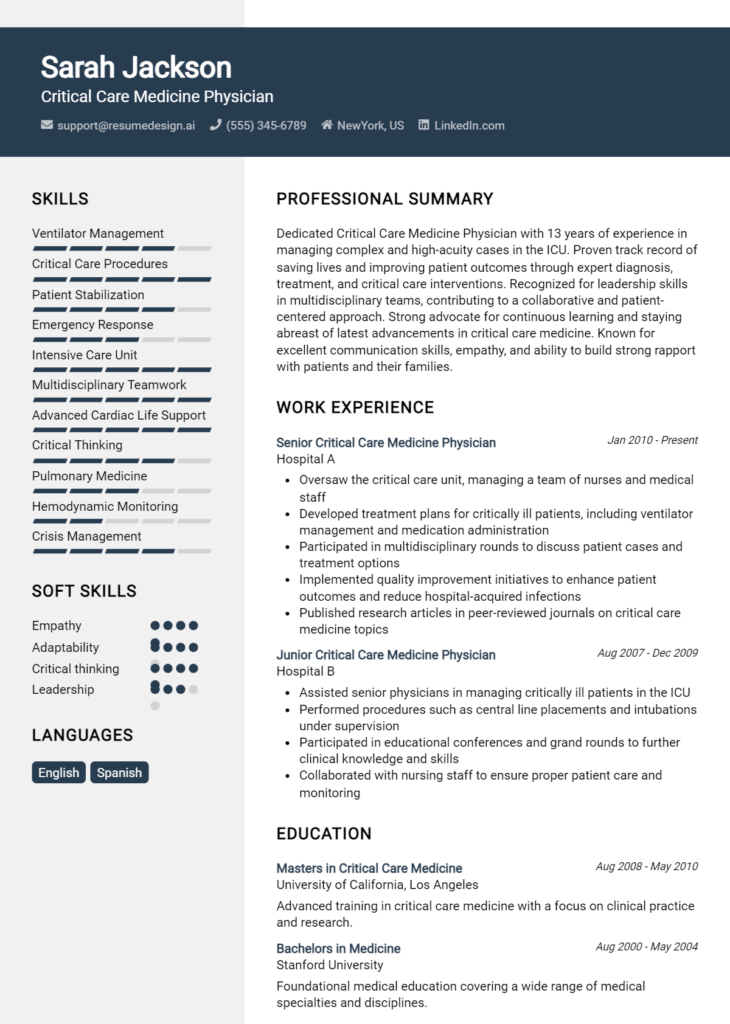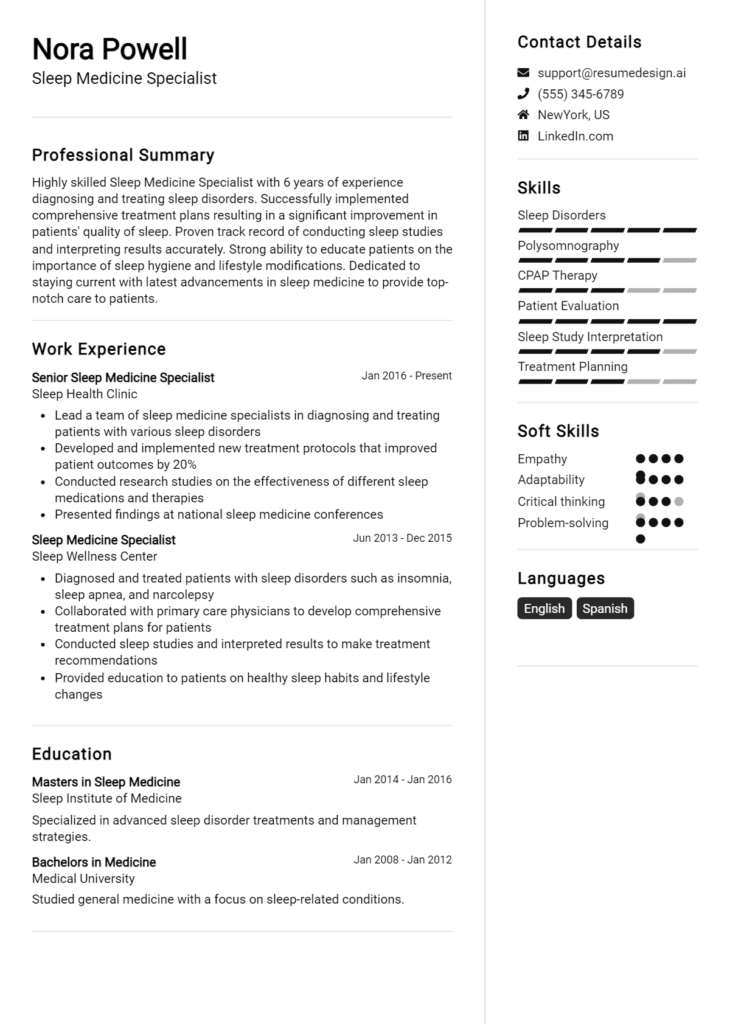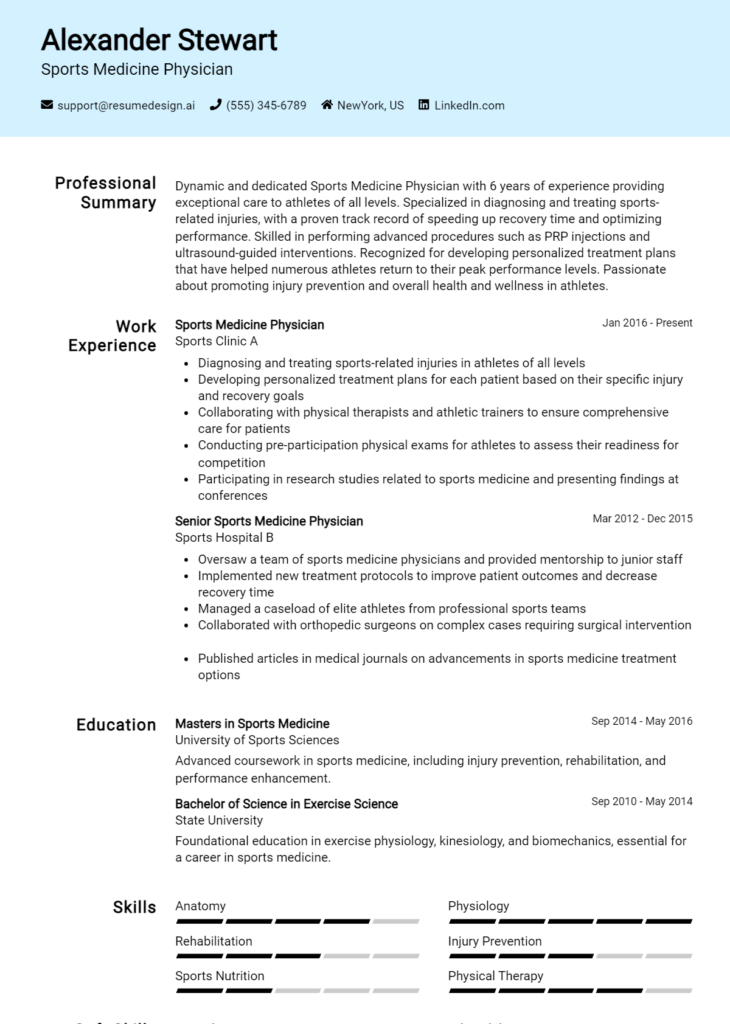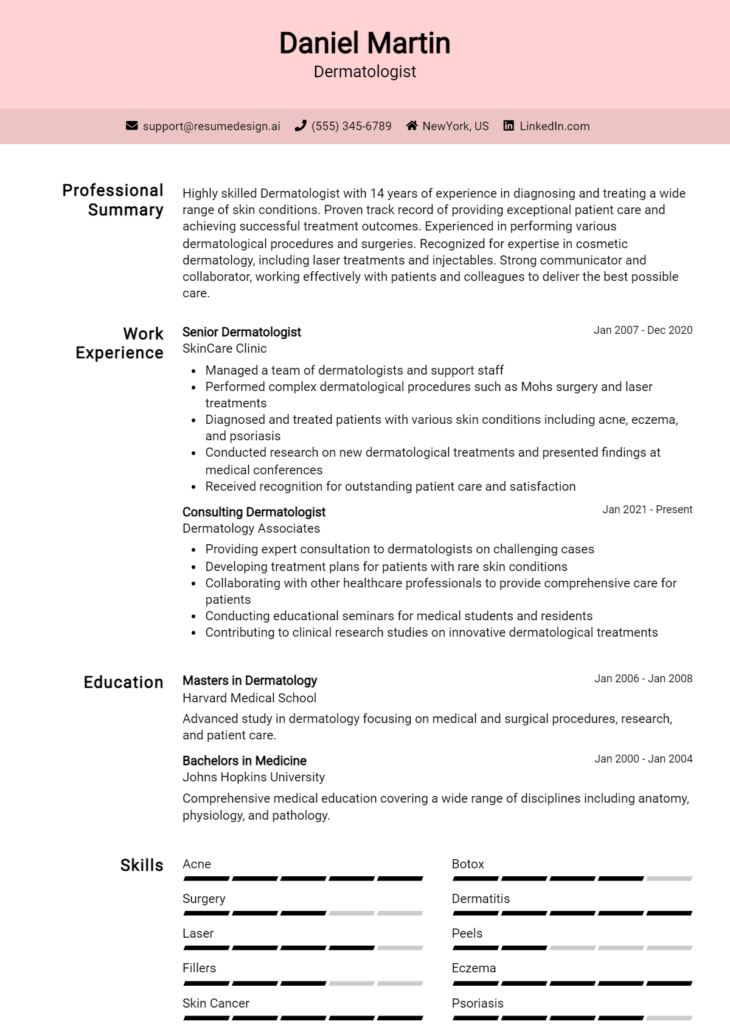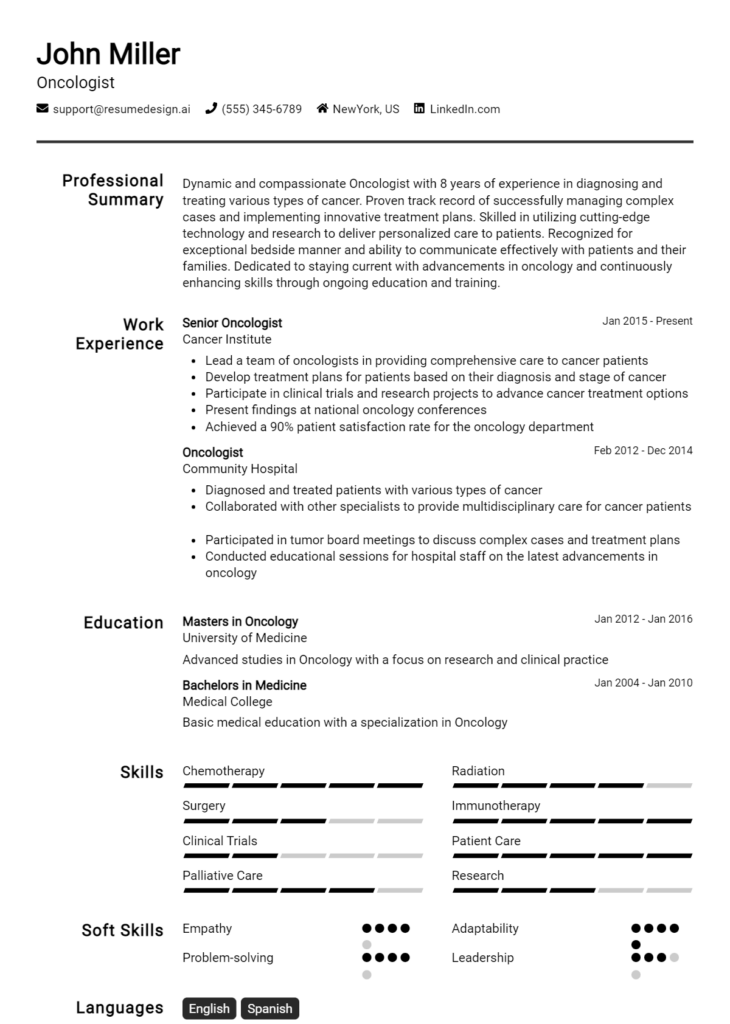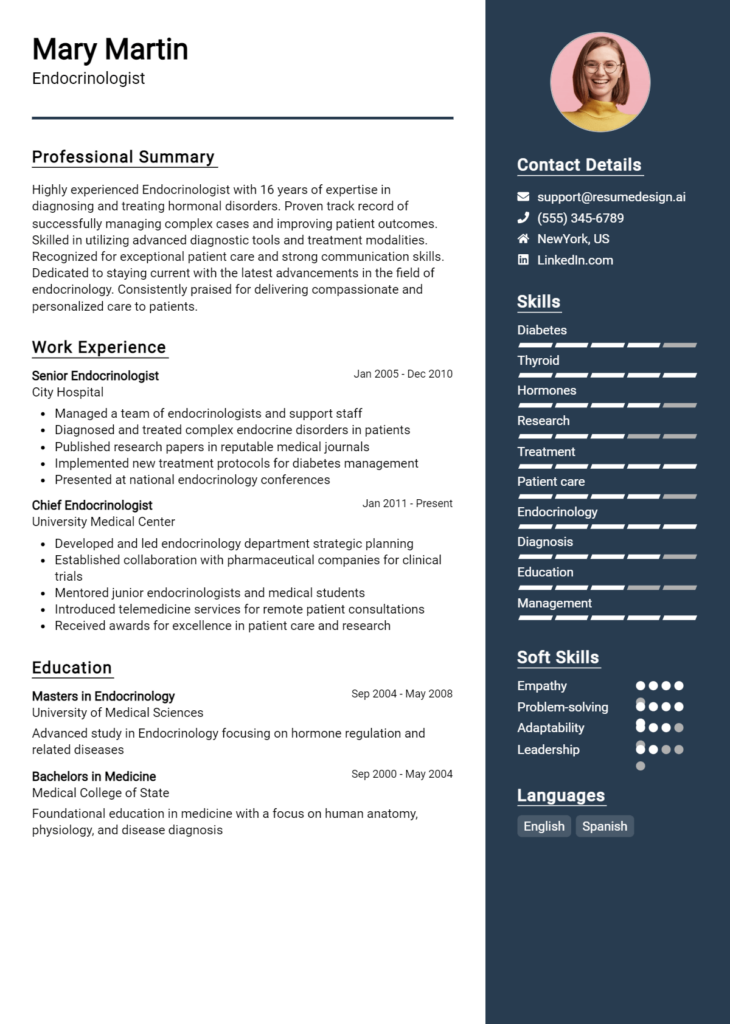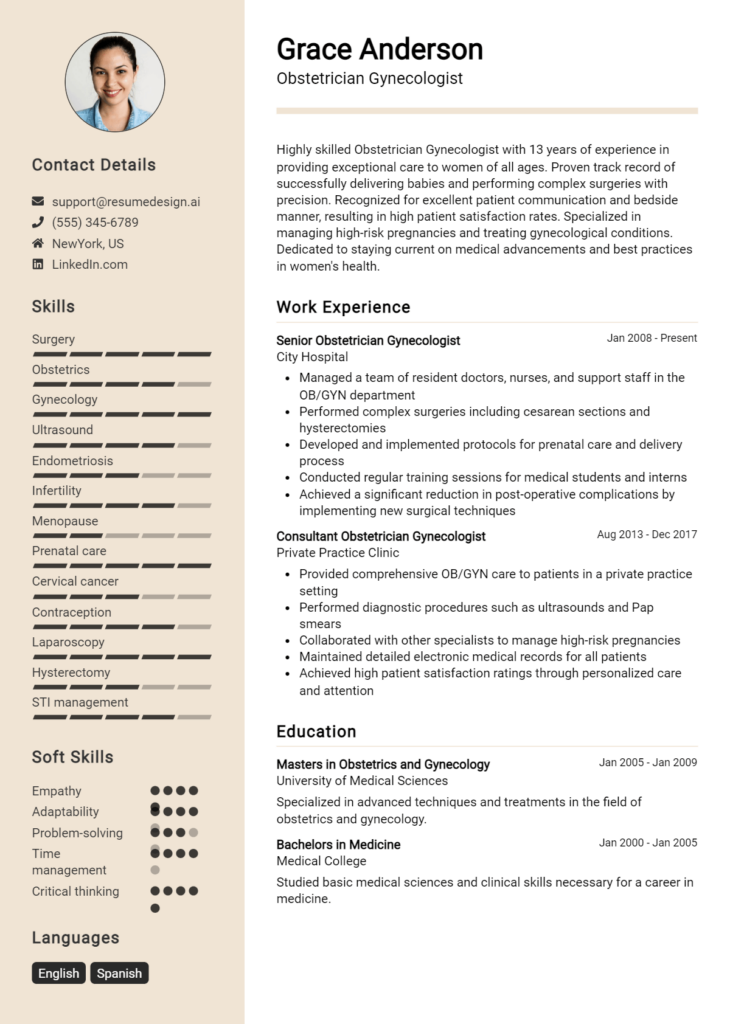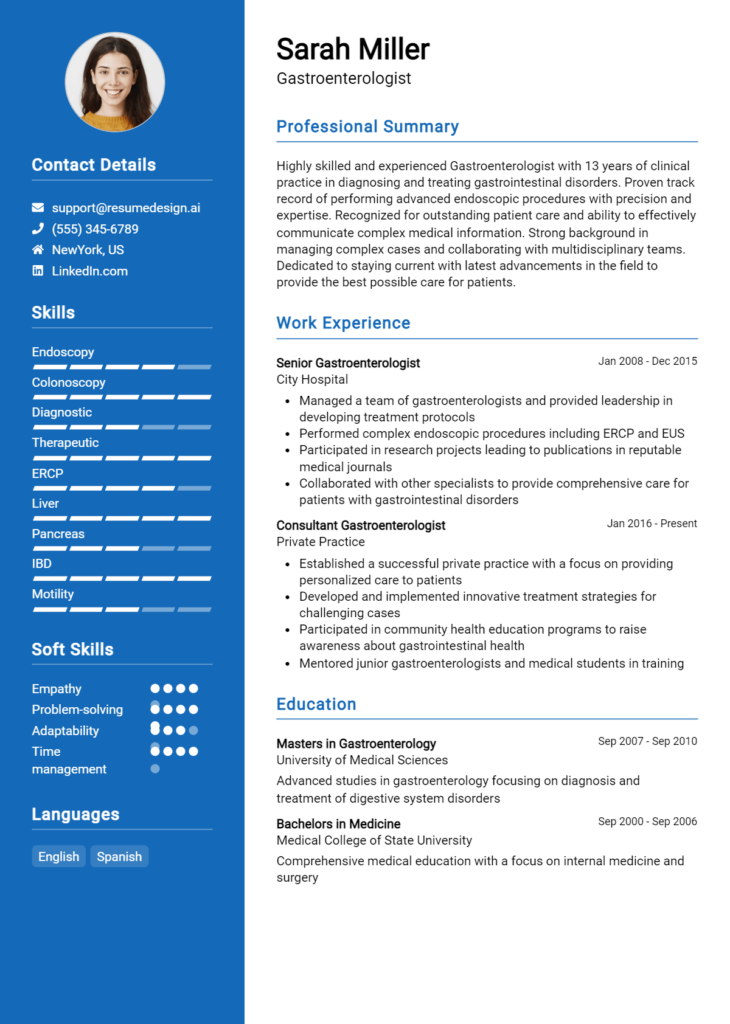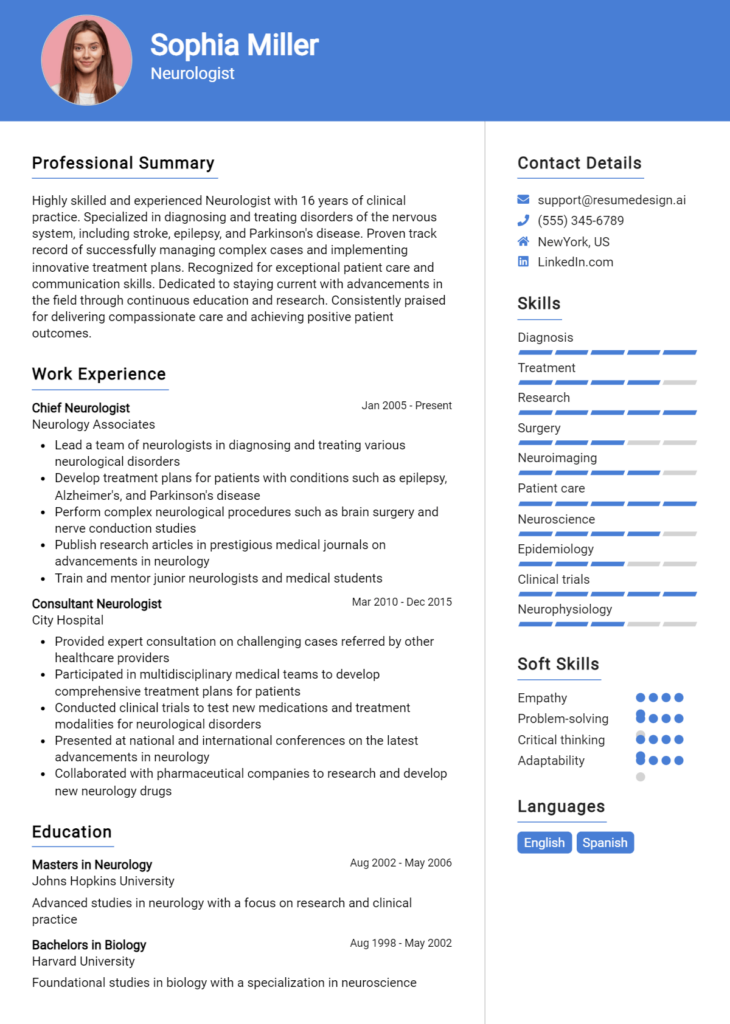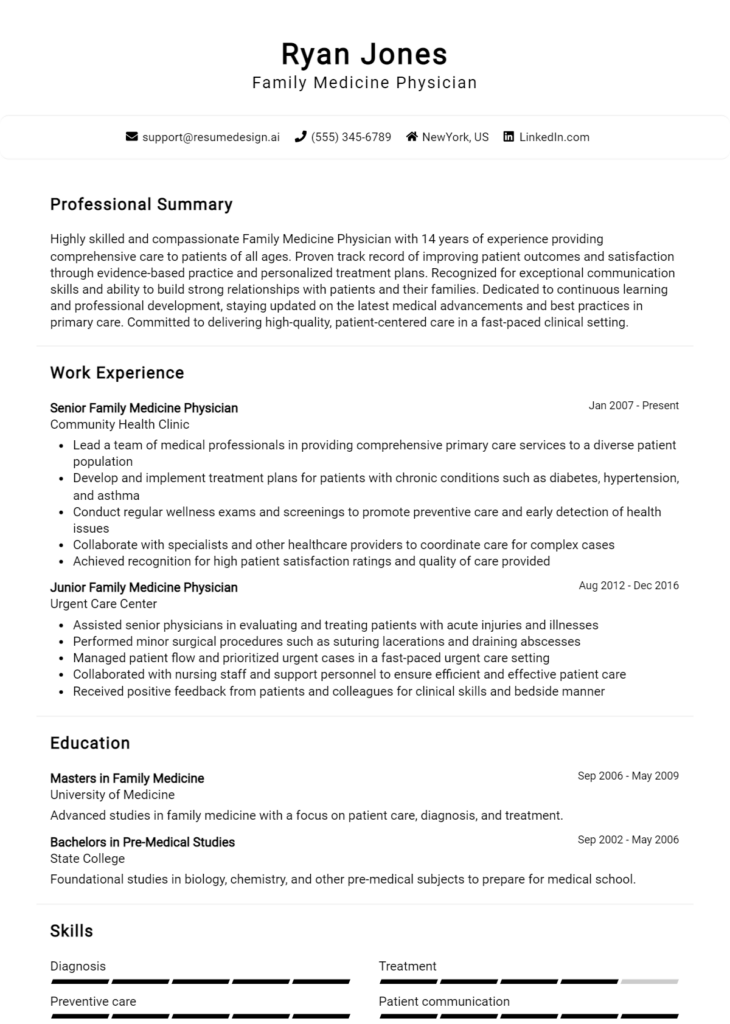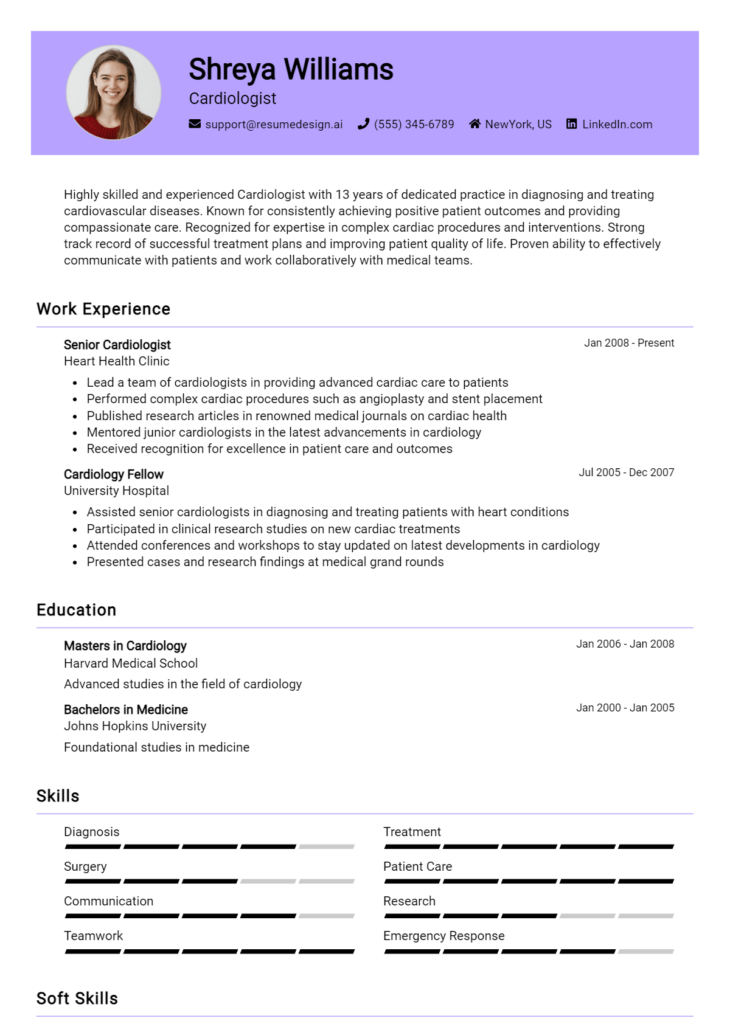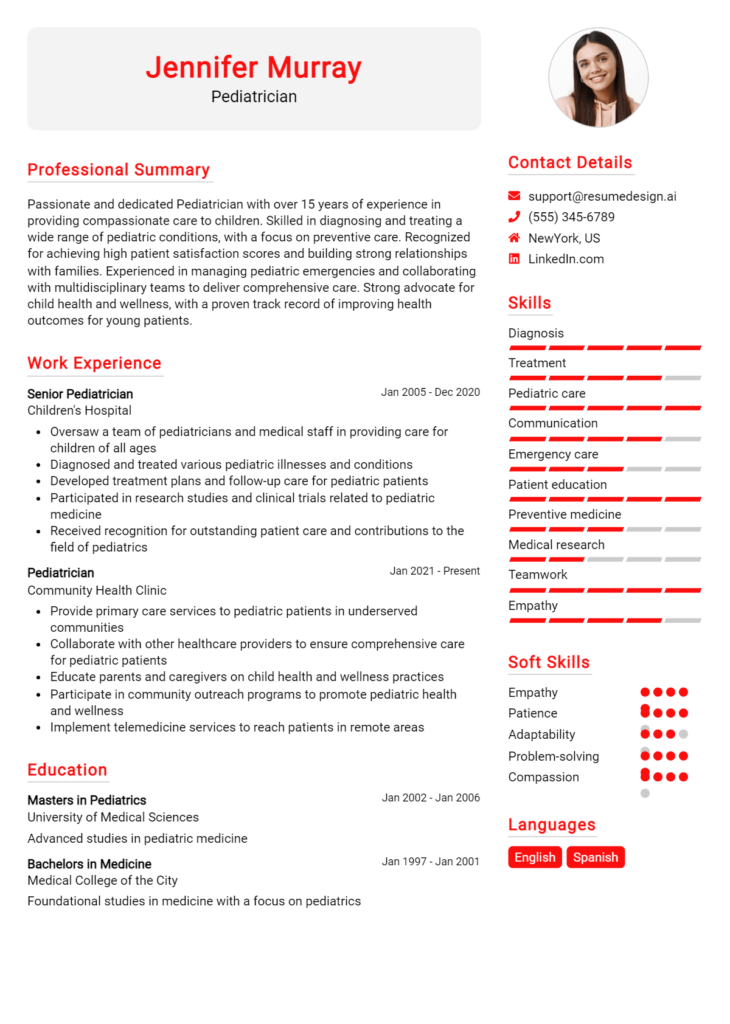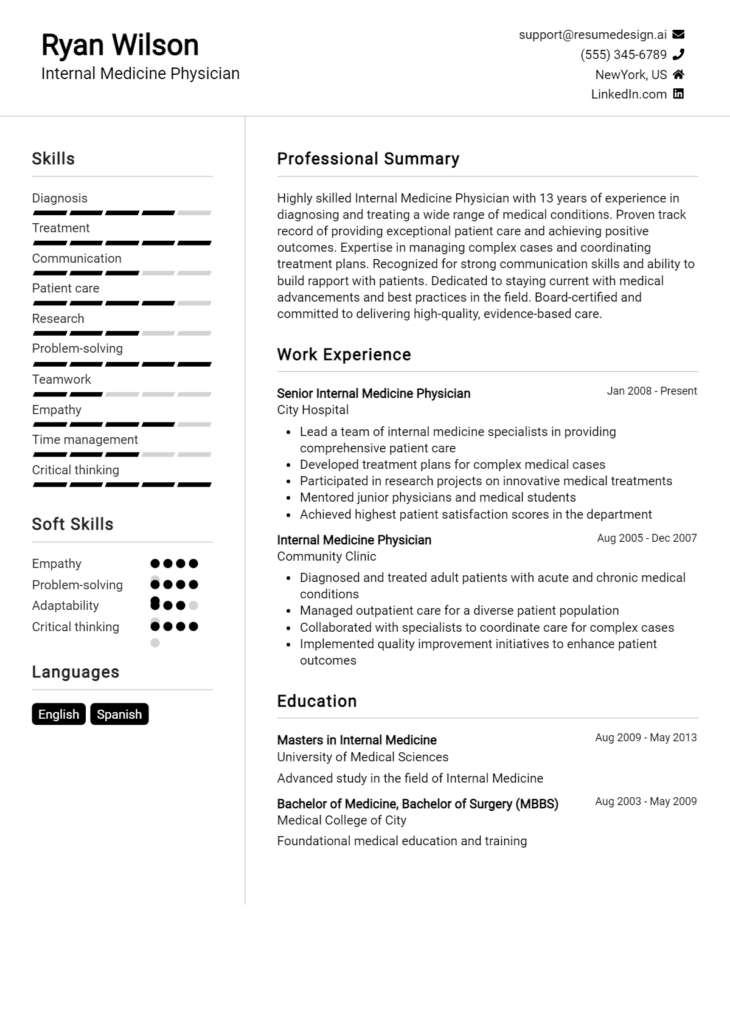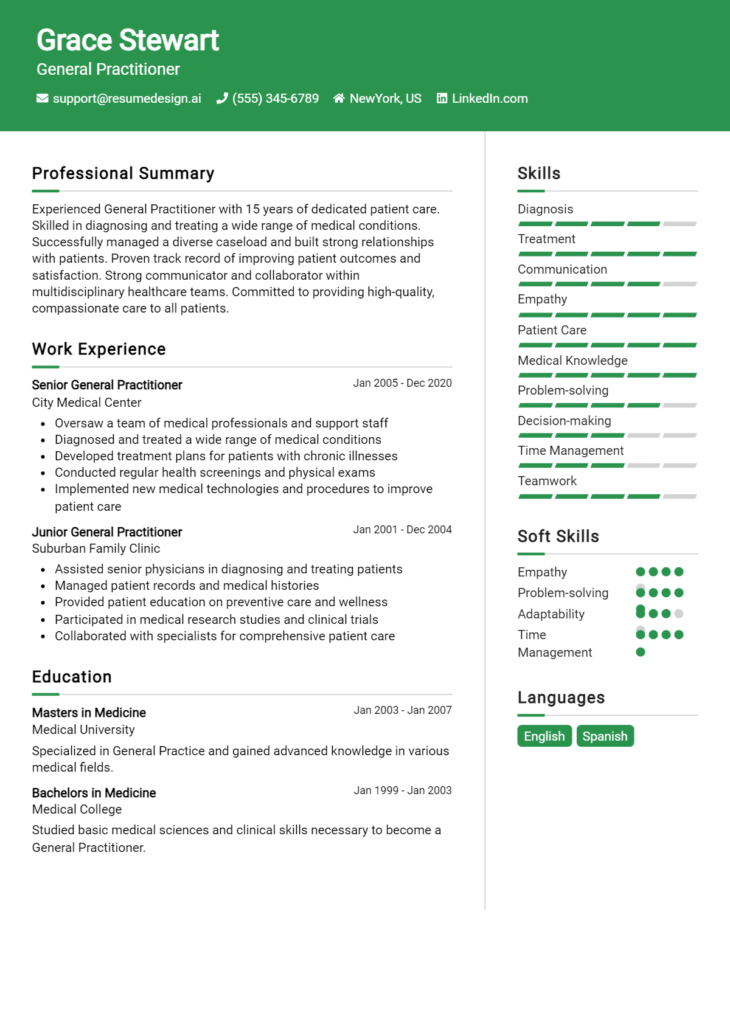Neonatologist Core Responsibilities
Neonatologists play a crucial role in the care of newborns, particularly those who are premature or critically ill. Their core responsibilities include diagnosing and treating various conditions, collaborating with pediatricians, nurses, and other specialists, and conducting research to improve neonatal care. Essential skills encompass advanced medical knowledge, technical proficiency in life-support systems, and strong problem-solving abilities. These competencies not only enhance patient outcomes but also align with the organization's goals of delivering high-quality healthcare. A well-structured resume can effectively highlight these qualifications, showcasing a Neonatologist's expertise and contributions.
Common Responsibilities Listed on Neonatologist Resume
- Assess and monitor the health of newborns in intensive care units.
- Provide specialized care for premature and critically ill infants.
- Collaborate with multidisciplinary teams to develop treatment plans.
- Perform diagnostic tests and interpret results.
- Administer life-saving treatments and interventions.
- Educate and support families regarding neonatal conditions.
- Conduct research and participate in clinical trials for neonatal therapies.
- Maintain accurate medical records and documentation.
- Ensure compliance with healthcare regulations and standards.
- Advocate for best practices in neonatal care.
- Train and mentor medical staff in neonatal care techniques.
High-Level Resume Tips for Neonatologist Professionals
In the competitive field of neonatology, a well-crafted resume is essential for standing out among a pool of qualified candidates. Your resume often serves as the first impression you make on potential employers, making it crucial to accurately reflect your skills, experiences, and achievements in the specialty. A compelling resume not only highlights your clinical expertise but also showcases your contributions to neonatal care, all while aligning with the specific needs of the institution you are applying to. This guide will provide practical and actionable resume tips specifically tailored for Neonatologist professionals, helping you to present yourself as the ideal candidate for the role.
Top Resume Tips for Neonatologist Professionals
- Tailor your resume for each application by aligning your skills and experiences with the job description.
- Highlight your relevant clinical experience, including the types of neonatal conditions you've treated.
- Quantify your achievements, such as the number of successful interventions or improvements in patient outcomes.
- Showcase your certifications and training, including board certifications in neonatology and any specialized courses.
- Include specific examples of teamwork, collaboration, and leadership in multidisciplinary settings.
- Emphasize your commitment to continuing education and staying updated on the latest advancements in neonatology.
- Utilize industry-specific terminology to demonstrate your familiarity with current practices and standards.
- Highlight any published research or presentations at conferences that showcase your expertise in the field.
- Format your resume clearly and professionally, using bullet points for easy readability.
- Incorporate a strong summary statement at the beginning that encapsulates your experience and passion for neonatal care.
By implementing these tips into your resume, you can significantly increase your chances of landing a job in the Neonatologist field. A focused and well-structured resume not only conveys your qualifications but also demonstrates your dedication to providing exceptional care for vulnerable newborns, setting you apart as a top candidate in this critical specialty.
Why Resume Headlines & Titles are Important for Neonatologist
In the highly specialized field of neonatology, crafting a compelling resume is essential for standing out among numerous qualified candidates. A well-crafted resume headline or title serves as the first point of contact between a neonatologist and hiring managers, encapsulating a candidate's key qualifications in a succinct and impactful manner. This brief yet powerful phrase not only grabs attention but also sets the tone for the rest of the resume. A strong headline should be concise, relevant, and directly aligned with the job being applied for, allowing hiring managers to quickly assess the candidate's suitability for their practice or institution.
Best Practices for Crafting Resume Headlines for Neonatologist
- Keep it concise: Limit the headline to a few impactful words that summarize your expertise.
- Be role-specific: Tailor the headline to reflect the specific position of neonatologist.
- Highlight key qualifications: Focus on your most impressive skills or experiences.
- Use active language: Start with strong action verbs to convey confidence and capability.
- Avoid jargon: Use clear language that can be understood by all hiring personnel.
- Include relevant certifications: Mention any board certifications or specialized training.
- Showcase years of experience: If applicable, include your years of experience in the field.
- Align with job description: Review the job posting and incorporate key terms from it into your headline.
Example Resume Headlines for Neonatologist
Strong Resume Headlines
Compassionate Neonatologist with 10+ Years of Experience in Critical Care
Board-Certified Neonatologist Specializing in High-Risk Newborn Care
Dedicated Neonatologist with Proven Track Record in NICU Management
Experienced Neonatologist Committed to Advancing Infant Health Outcomes
Weak Resume Headlines
Neonatologist Looking for New Opportunities
Doctor with Experience in Pediatrics
The strong headlines are effective because they convey specific qualifications and experiences relevant to the role of a neonatologist, immediately demonstrating the candidate's value. They utilize active language and highlight key strengths in a clear manner, making it easy for hiring managers to recognize the candidate's potential fit. In contrast, the weak headlines fall short due to their vague and generic nature, failing to provide any insight into the candidate's unique qualifications or expertise, which can lead to being overlooked in a competitive job market.
Writing an Exceptional Neonatologist Resume Summary
A strong resume summary is essential for a Neonatologist, as it serves as the first impression a hiring manager will have of a candidate's qualifications and expertise. This concise overview quickly captures attention by highlighting key skills, relevant experience, and notable accomplishments that align with the specific demands of the role. An impactful summary not only showcases a candidate’s qualifications but also sets the tone for the rest of the resume, making it crucial for candidates to tailor their summaries to the job they are applying for.
Best Practices for Writing a Neonatologist Resume Summary
- Quantify Achievements: Use specific numbers to highlight your accomplishments, such as the number of patients treated or improvements in patient outcomes.
- Focus on Relevant Skills: Highlight skills that are critical for a Neonatologist, such as advanced neonatal care, diagnostic skills, and teamwork.
- Tailor the Summary: Customize your summary for each job application, reflecting the key responsibilities and qualifications mentioned in the job description.
- Keep it Concise: Aim for 2-3 sentences that effectively communicate your strengths without overwhelming the reader.
- Use Action Verbs: Start sentences with strong action verbs to convey your accomplishments and capabilities dynamically.
- Highlight Certifications: Mention any specialized certifications or training relevant to neonatal care, as these can set you apart from other candidates.
- Showcase Leadership: If applicable, include examples of leadership roles or contributions to team-based care that demonstrate your ability to lead in a clinical setting.
- Reflect Passion and Commitment: Convey your dedication to neonatal care and your enthusiasm for working with vulnerable populations.
Example Neonatologist Resume Summaries
Strong Resume Summaries
Compassionate Neonatologist with over 10 years of experience in managing complex neonatal cases in Level III NICUs. Achieved a 20% reduction in patient readmission rates through implementation of personalized care plans, enhancing overall patient outcomes.
Board-certified Neonatologist skilled in advanced neonatal resuscitation and critical care management. Successfully led a team in a quality improvement initiative that decreased hospital-acquired infections by 15%, resulting in improved patient safety and satisfaction.
Dedicated Neonatologist with expertise in diagnosing and treating high-risk infants. Recognized for achieving a 95% survival rate in extremely low birth weight infants, contributing to a leading NICU program in the region.
Weak Resume Summaries
Experienced Neonatologist looking for a new opportunity in a hospital setting. I have worked in various healthcare environments.
Neonatologist with many years of experience and skills in health care. Committed to providing good care to infants.
The strong resume summaries are considered effective because they provide specific achievements, quantify results, and align closely with the responsibilities of a Neonatologist. They demonstrate the candidate's impact and expertise in the field. In contrast, the weak summaries are vague, lack measurable outcomes, and do not convey unique qualifications or enthusiasm for the role, making them less memorable and impactful to hiring managers.
Work Experience Section for Neonatologist Resume
The work experience section of a Neonatologist resume is critical in demonstrating the candidate's expertise in a highly specialized field. This section not only showcases the technical skills essential for managing the complex care of neonates but also highlights the ability to lead multidisciplinary teams effectively. Delivering high-quality patient outcomes is paramount, and quantifying achievements such as reduced mortality rates or improved patient care processes can set a candidate apart. Aligning work experience with industry standards and best practices further emphasizes a Neonatologist's commitment to excellence in their field.
Best Practices for Neonatologist Work Experience
- Highlight specific technical skills relevant to neonatal care, such as advanced life support techniques or proficiency in neonatal imaging.
- Quantify achievements, such as the percentage of successful interventions or improvements in patient outcomes over a specific timeframe.
- Emphasize leadership roles in multidisciplinary teams, demonstrating the ability to collaborate effectively with nurses, pediatricians, and other specialists.
- Include specific examples of clinical protocols developed or implemented that enhanced neonatal care.
- Showcase participation in research studies or clinical trials that contributed to advancements in neonatal medicine.
- Detail any educational roles, such as training medical students or residents, to illustrate commitment to the field.
- Align experience descriptions with established industry standards and guidelines to demonstrate knowledge of best practices.
- Use action verbs to convey accomplishments dynamically, making the resume more engaging and impactful.
Example Work Experiences for Neonatologist
Strong Experiences
- Led a team of 10 healthcare professionals in a neonatal intensive care unit, resulting in a 30% reduction in patient morbidity rates over two years.
- Implemented a new neonatal resuscitation protocol that improved successful intubation rates by 25%, significantly enhancing patient outcomes.
- Collaborated with a cross-functional team to design and execute a research study on neonatal sepsis, contributing to a publication in a leading medical journal.
- Trained and mentored 15 residents in advanced neonatal care techniques, fostering a new generation of specialists in the field.
Weak Experiences
- Worked in a hospital setting with newborns.
- Participated in various tasks in the neonatal unit.
- Assisted in the care of neonates alongside other staff.
- Performed routine checks on babies.
The examples labeled as strong are considered effective because they provide quantifiable outcomes, showcase leadership and collaboration, and illustrate a direct impact on patient care and professional development. In contrast, the weak experiences lack specificity, quantifiable results, and do not convey a clear understanding of the candidate's contributions or expertise in neonatal medicine, which could leave potential employers unimpressed.
Education and Certifications Section for Neonatologist Resume
The education and certifications section of a Neonatologist resume is critical for showcasing the candidate's academic foundation and specialized training in the field of neonatology. This section serves to highlight not only the essential degrees and certifications but also the commitment to continuous learning and professional development that is vital in the ever-evolving medical landscape. By providing relevant coursework, industry-recognized certifications, and any specialized training, candidates can significantly enhance their credibility and demonstrate their alignment with the specific demands of the job role. A well-crafted education and certifications section can set a candidate apart in a competitive field, emphasizing their preparedness to provide the highest level of care to vulnerable newborns.
Best Practices for Neonatologist Education and Certifications
- Include relevant medical degrees, such as an MD or DO, with a focus on pediatrics or neonatology.
- List board certifications, such as Board Certified in Neonatal-Perinatal Medicine.
- Highlight any fellowships completed in neonatology or related specialties.
- Provide details of relevant coursework that pertains to neonatal care, critical care, or pediatrics.
- Incorporate any advanced certifications, such as Pediatric Advanced Life Support (PALS) or Neonatal Resuscitation Program (NRP).
- Mention ongoing education, such as participation in workshops, conferences, or online courses related to neonatology.
- Use specific dates to reflect the timeline of education and certifications for clarity.
- Tailor the section to align with the job description, emphasizing qualifications that meet the employer's needs.
Example Education and Certifications for Neonatologist
Strong Examples
- Doctor of Medicine (MD) from Harvard Medical School, 2015
- Board Certified in Neonatal-Perinatal Medicine, American Board of Pediatrics, 2018
- Completed Fellowship in Neonatology at Johns Hopkins University, 2019
- Pediatric Advanced Life Support (PALS) Certification, valid until 2025
Weak Examples
- Bachelor of Arts in Psychology, University of California, 2010
- Certification in Basic Life Support (BLS), expired 2019
- General Practitioner Certificate from a non-accredited institution, 2012
- Outdated Neonatal Resuscitation Program (NRP) certification from 2017
The examples provided are considered strong because they directly relate to the qualifications and skills necessary for a Neonatologist, showcasing relevant medical degrees, board certifications, and specialized training that align with the job requirements. In contrast, the weak examples illustrate a lack of relevance to neonatology, featuring outdated or unrelated qualifications that do not demonstrate the candidate's preparedness for a specialized role in neonatal care.
Top Skills & Keywords for Neonatologist Resume
As a Neonatologist, the importance of skills in your resume cannot be overstated. This specialized medical field requires a unique blend of both hard and soft skills that reflect your ability to provide exceptional care for critically ill newborns. A well-crafted resume not only showcases your medical expertise but also highlights your interpersonal abilities, which are crucial for collaborating with families and multidisciplinary teams. By integrating relevant skills into your resume, you can effectively demonstrate your qualifications and stand out in a competitive job market.
Top Hard & Soft Skills for Neonatologist
Soft Skills
- Compassionate communication
- Empathy and emotional intelligence
- Teamwork and collaboration
- Problem-solving skills
- Adaptability and flexibility
- Time management
- Attention to detail
- Critical thinking
- Leadership abilities
- Stress management
Hard Skills
- Neonatal resuscitation techniques
- Familiarity with neonatal intensive care unit (NICU) protocols
- Proficient in interpreting laboratory results
- Knowledge of pharmacology related to neonatology
- Advanced life support certification
- Experience with neonatal imaging techniques
- Ability to perform procedures such as intubation and venipuncture
- Familiarity with electronic health records (EHR)
- Understanding of neonatal nutrition and breastfeeding
- Data analysis and research skills
Incorporating these skills into your resume can significantly enhance your profile, along with showcasing relevant work experience, to present a comprehensive overview of your qualifications as a Neonatologist.
Stand Out with a Winning Neonatologist Cover Letter
Dear [Hiring Manager's Name],
I am writing to express my interest in the Neonatologist position at [Hospital/Organization Name], as advertised on [where you found the job listing]. With a specialization in neonatology and over [X years] of experience in managing critically ill newborns, I am excited about the opportunity to contribute to your esteemed institution. My clinical expertise, coupled with my passion for providing high-quality care to the tiniest patients and their families, makes me a strong candidate for this role.
Throughout my career, I have honed my skills in assessing and managing a wide range of neonatal conditions, including prematurity, congenital anomalies, and respiratory distress syndrome. At [Previous Hospital/Organization Name], I successfully led a multidisciplinary team in developing evidence-based protocols that improved patient outcomes and reduced hospital stays for neonates. My dedication to continuous education and staying current with advancements in neonatology allows me to provide the best possible care while mentoring junior staff and engaging in collaborative research initiatives.
Additionally, I believe that effective communication is paramount in neonatal care. I consistently strive to establish strong relationships with families, providing them with the support and information they need during such challenging times. My commitment to fostering a compassionate environment aligns perfectly with the values of [Hospital/Organization Name]. I am eager to bring my clinical skills, leadership abilities, and dedication to patient-centered care to your neonatal unit.
Thank you for considering my application. I look forward to the possibility of discussing how my background, skills, and enthusiasms align with the goals of [Hospital/Organization Name]. I am excited about the opportunity to make a positive impact on the lives of newborns and their families in your care.
Sincerely,
[Your Name]
[Your Contact Information]
[LinkedIn Profile or Professional Website, if applicable]
Common Mistakes to Avoid in a Neonatologist Resume
Crafting a compelling resume is crucial for neonatologists seeking to showcase their unique skills and experience in the highly specialized field of neonatal care. However, many candidates fall into common pitfalls that can undermine their chances of landing an interview. By avoiding these mistakes, neonatologists can present themselves more effectively to potential employers, highlighting their qualifications and passion for working with newborns. Here are some common mistakes to avoid when creating a neonatologist resume:
Lack of Specificity: Failing to include specific details about your clinical experience, such as the types of cases handled or procedures performed, can make your resume less impactful.
Ignoring Keywords: Not incorporating relevant keywords from the job description may lead to your resume being overlooked by applicant tracking systems (ATS) or hiring managers.
Overly Generalized Objective Statements: Using vague objective statements instead of a tailored summary that highlights your unique qualifications can weaken your resume.
Poor Formatting: A cluttered or confusing layout can distract from your accomplishments. Ensure your resume is clean, organized, and easy to read.
Neglecting Continuing Education: Failing to mention certifications, fellowships, or ongoing training can give the impression that you are not committed to professional development.
Inconsistent Chronology: Listing job experiences in a non-chronological order can confuse the reader. Stick to a consistent format to ensure clarity.
Omitting Soft Skills: Focusing solely on technical skills without mentioning important soft skills like communication and teamwork can make you seem less well-rounded.
Not Tailoring for Each Application: Sending out a generic resume without customizing it for each position can make you appear less interested in the specific role or organization.
Conclusion
As a Neonatologist, your expertise in caring for premature and critically ill newborns is invaluable. You play a crucial role in neonatal intensive care, diagnosing and managing complex medical conditions, and providing support to new parents during challenging times. Your qualifications, skills, and experience are essential in ensuring the best outcomes for vulnerable infants.
In this article, we discussed the importance of showcasing your specialized skills, such as proficiency in neonatal resuscitation, familiarity with advanced technologies, and experience in collaborative care settings. We also highlighted the significance of continuing education and professional development in staying current with the latest advancements in neonatology.
To stand out in a competitive job market, it is vital to have a well-crafted resume that effectively reflects your qualifications and experiences. We encourage you to take the time to review your Neonatologist resume and ensure it highlights your unique strengths and accomplishments.
Utilize available resources to enhance your resume, such as resume templates, which can provide a structured format to present your information clearly. The resume builder offers a streamlined approach to create a professional-looking resume tailored to your specific needs. Additionally, reviewing resume examples can inspire you to include impactful language and achievements that resonate with hiring managers. Don’t forget to consider cover letter templates to complement your resume and introduce yourself effectively.
Take action today and refine your resume to ensure it reflects your dedication and expertise as a Neonatologist.

